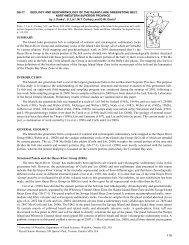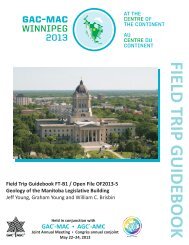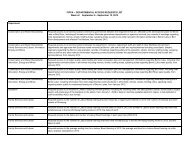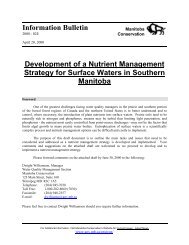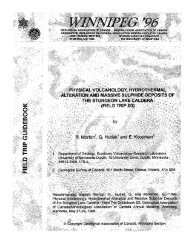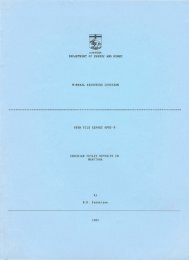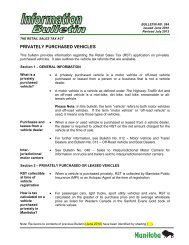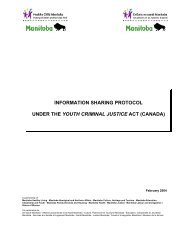Applying Manitoba's Water Policies - Government of Manitoba
Applying Manitoba's Water Policies - Government of Manitoba
Applying Manitoba's Water Policies - Government of Manitoba
You also want an ePaper? Increase the reach of your titles
YUMPU automatically turns print PDFs into web optimized ePapers that Google loves.
<strong>Applying</strong> the <strong>Policies</strong><strong>Water</strong> Supply• explore and implement, in cooperation with localauthorities and user groups, water pricing and otherdemand management techniques to discourage specifichigh volume water uses that might jeopardizethe availability <strong>of</strong> drinking water.• test drinking water samples, on a cost-recoverybasis where applicable, for local jurisdictions andindividuals for assessment <strong>of</strong> the water’s safety, suitability,and any required treatment.2. Municipal councils and other local jurisdictionalbodies can:• participate in basin, watershed, and aquifer planningand other water supply and demand studiesand strategies.3. Industry, business, and individuals can:• participate in basin, watershed, and aquifer planningand other strategies and studies to assess presentand future drinking water needs and sources <strong>of</strong>supply.• ensure they are aware <strong>of</strong> potable water sources, pollutionhazard areas, and practices and activities thatmay damage their drinking water sources.• adopt appropriate development, land use, andsewage and waste disposal technology and practicesto protect their drinking water supplies.• periodically have samples <strong>of</strong> their drinking watertested to confirm its safety and suitability, and todetermine any required treatment.• consult with government specialists and otherknowledgeable sources to enhance local awareness<strong>of</strong> drinking water sources, pollution hazard areas,and measures necessary to protect drinking watersources.• use local land use planning and by-laws to ensurethat land use does not directly or indirectly causedrinking water sources to be degraded.• adopt water pricing and other supporting demandmanagement measures to ensure that drinking waterneeds are not superseded by lower priority uses.• ensure that local government works and operationsdo not harm potable drinking water sources.• assist the provincial government in identifying activitiesand situations that might damage drinkingwater sources.• periodically have samples from community drinkingwater sources tested to confirm the water's safetyand suitability, and to determine any additionalwater treatment needs.49



